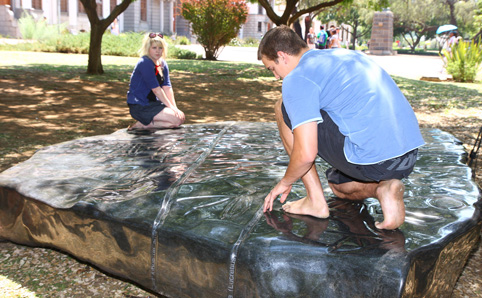Latest News Archive
Please select Category, Year, and then Month to display items
12 January 2024
|
Story Nonsindiswe Qwabe
|
Photo Sonia Small
 Since joining the UFS in 2008, Dr Grey Magaiza has worked extensively on approaches that can foster the socio-economic transformation of societies.
Since joining the UFS in 2008, Dr Grey Magaiza has worked extensively on approaches that can foster the socio-economic transformation of societies.
“The future should be one where communities can decide on their development agenda and futures. That’s the most important for me.” Dr Grey Magaiza, Deputy Director of the Centre for Gender and Africa Studies (CGAS) and Head of the Community Development programme on the Qwaqwa Campus, is passionate about capacitating communities to be agents of change and advancement. His vision for the future emphasises the empowerment of communities to take charge of their development by actively participating in decision making and the implementation of development projects that can improve their lives.
Since joining the UFS in 2008, Dr Magaiza has worked extensively on approaches that can foster the socio-economic transformation of societies. Over the years, he has crafted his research speciality into one that he is most proud of – being an interdisciplinary scientist immersed in the development of communities.
“I’m in a fortunate position of researching what I like. I say ‘fortunate’, because I’ve taken the time to understand what I’m passionate about, which is the overall field of rural livelihoods and livelihood futures – in short, community development. My research starts from an engaged university, understanding the elements that a university must use to enhance transformation and relevance to its immediate community in terms of development.”
One of the ways he has done this is by looking at social entrepreneurship as a development approach for young people in a rural setting. Through workshops with non-profit and civic organisations in Qwaqwa, Dr Magaiza has been helping these organisations to map out their needs and actively meet them through the involvement and support of external role players.
“We understand that communities are part of the national development agenda, but even that national agenda respects community knowledge and intentions and allows communities to shape their identity. A critical enabler of this is community organising. You bring back the capacity in communities to have dialogues on issues affecting them as spaces for engagement, knowledge exchange, and for people to just talk about their way forward.”
By enabling communities to define their development agenda, they can address their specific needs, challenges, and aspirations, he said. “When I look at livelihood futures, it’s quite an exciting aspect of my work – it’s like looking into a fortune tellers’ globe, because you’re not deciding for communities what they should do, but the communities themselves take those decisions.”
Willem Boshoff’s artwork placed on Bloemfontein Campus
2011-10-21
 |
Students viewing the new artwork on our Bloemfontein Campus
Photo: Hannes Pieterse |
There was great excitement last week when Willem Boshoff’s Thinking Stone sculpture arrived and was installed near our Main Building. The black granite stone, which was quarried at Boschpoort Granite in Belfast, Mpumalanga, weighs approximately 20 tons and took about a year to polish to give it its burnished quality.
On the surface of the stone are engravings that resemble the prehistoric rock engravings of the Driekopseiland rock art site close to Kimberley. Added to the engravings are sandblasted inscriptions in six languages of verses and well-known quotes that refer to the word “rock”.
Willem Boshoff is one of South African’s most established artists and his artworks are deeply involved in relationships and focused on bringing about conversation. Willem describes the Thinking Stone as being “a place for gathering and sharing ideas, as universities should be”. The sculpture is a huge investment for our university and will, for many years to come, inspire thought, dialogue and contemplation.
Willem Boshoff’s sculpture is, to date, the largest of fifteen artworks commissioned by the Sculpture-on-Campus Project and funded by the National Lottery Distribution Trust Fund.